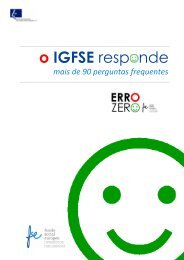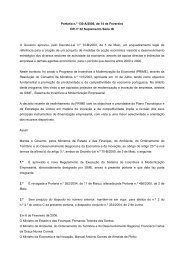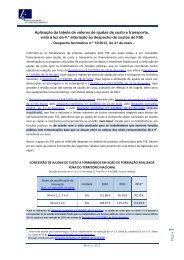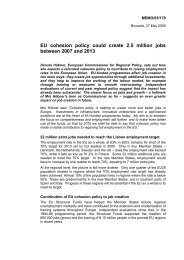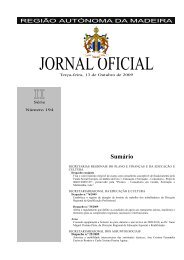Industrial Relations in Europe 2012 - European Commission - Europa
Industrial Relations in Europe 2012 - European Commission - Europa
Industrial Relations in Europe 2012 - European Commission - Europa
You also want an ePaper? Increase the reach of your titles
YUMPU automatically turns print PDFs into web optimized ePapers that Google loves.
established tripartite cooperation. In other countries, such as Belgium, the Netherlands and France,<br />
the preparation and establishment of unemployment benefit systems is dom<strong>in</strong>ated by bipartite<br />
consultation.<br />
At the other end of the scale, the new EU Member States have only recently developed tripartite<br />
concertation and social dialogue as a whole does not have a long history. Further, <strong>in</strong> countries such<br />
as the UK, Germany and Greece, there is an absence of tripartite consultation on unemployment<br />
benefits (Schaapman M and van het Kaar R 2007).<br />
Similarly, the role of the social partners <strong>in</strong> the adm<strong>in</strong>istration of unemployment benefit systems<br />
ranges from high levels of formal <strong>in</strong>volvement and participation to countries where the social<br />
partners have no role at all. Schaapman M and van het Kaar R (2007) have summarised the<br />
<strong>in</strong>volvement of the social partners <strong>in</strong> the adm<strong>in</strong>istration of unemployment benefit schemes and<br />
unemployment benefit services, highlight<strong>in</strong>g national differences. For example, although the French<br />
social partners play a formal role <strong>in</strong> decision-mak<strong>in</strong>g, their actual <strong>in</strong>fluence is reported to be<br />
m<strong>in</strong>imal. In Greece, although efforts have been made to <strong>in</strong>clude the social partners more fully <strong>in</strong> the<br />
adm<strong>in</strong>istration of benefits, their <strong>in</strong>fluence is reported to rema<strong>in</strong> m<strong>in</strong>imal <strong>in</strong> practical terms. This is<br />
also reported to be the case <strong>in</strong> Spa<strong>in</strong>, where, although there are high levels of <strong>in</strong>volvement, actual<br />
<strong>in</strong>fluence is not reported to be high. Conversely, <strong>in</strong> countries such as Cyprus, Ireland, Italy,<br />
Norway, Slovakia and the UK, the social partners have no formal role <strong>in</strong> the adm<strong>in</strong>istration of the<br />
unemployment benefits system.<br />
Countries where there are high levels of formal <strong>in</strong>volvement and <strong>in</strong>fluence <strong>in</strong>clude Austria,<br />
Belgium, Denmark, F<strong>in</strong>land, France, Slovenia and Sweden, where the social partners play an<br />
important role <strong>in</strong> the adm<strong>in</strong>istration of unemployment benefit systems. This list <strong>in</strong>cludes the<br />
countries <strong>in</strong> which the Ghent system operates (see below).<br />
The most recent comparative research exam<strong>in</strong><strong>in</strong>g social partner <strong>in</strong>volvement <strong>in</strong> unemployment<br />
benefit systems (Eurofound <strong>2012</strong>) groups the <strong>in</strong>volvement of the social partners <strong>in</strong> these systems<br />
<strong>in</strong>to five categories:<br />
■ <strong>in</strong>stitutional <strong>in</strong>volvement <strong>in</strong> stable tripartite <strong>in</strong>stitutions connected to the policy-mak<strong>in</strong>g process.<br />
This is the case <strong>in</strong> a large number of cont<strong>in</strong>ental and Nordic countries, such as AT, DE, LU, NL,<br />
DK, PT, BG, CY, CZ, EE, EL, HU, LV, LT, PL, RO, SK, SI;<br />
■ <strong>in</strong>stitutional <strong>in</strong>volvement <strong>in</strong> stable bipartite bodies associated to the process, such as BE and FR;<br />
■ <strong>in</strong>volvement <strong>in</strong> ad hoc committees established by public authorities when needed, as <strong>in</strong> FI;<br />
■ Non-formal <strong>in</strong>volvement <strong>in</strong> <strong>in</strong>formation and consultation practices with<strong>in</strong> policy-mak<strong>in</strong>g<br />
process, such as <strong>in</strong> IT, NO, SE, UK; and<br />
■ participation without (at least explicit) <strong>in</strong>volvement on the part of the state, as <strong>in</strong> IE, MT, ES.<br />
Under this classification, Eurofound notes that <strong>in</strong> almost all countries, the social partners are, to<br />
some extent or another, <strong>in</strong>volved by public authorities <strong>in</strong> the design or readjustment of<br />
unemployment benefit systems. However, it is important to stress that the form that <strong>in</strong>volvement<br />
takes does not necessarily predict the actual role of the social partners <strong>in</strong> the decision-mak<strong>in</strong>g<br />
process.<br />
235



